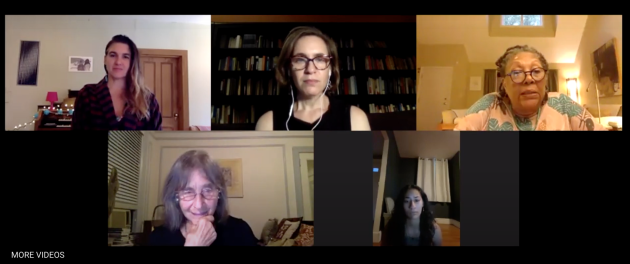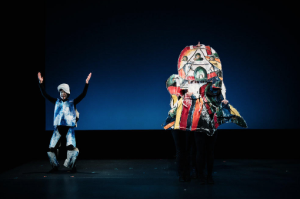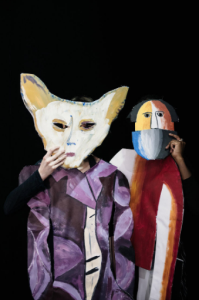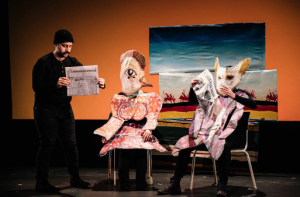Author Archives: Elana Rebitzer
August 10, 2020 by Elana Rebitzer
Countering Isolation with Poetry
Over the last few months, I have found myself attending fewer and fewer of the Zoom live-streamed events that keep popping up on my Facebook page. What at first seemed like an exciting way to connect to new and old faces in the age of social distancing has started to feel like more of a chore, a less-than-pleasant activity to be avoided whenever possible. Time and time again, I exit these Zoom events feeling even more isolated than before.

“Poetry in Times of Peril,” presented by Hebrew College-Interfaith Youth Core PsalmSeason project, with co-sponsors Jewish Women’s Archive and Lilith magazine, could have added to that feeling of isolation. Instead, it addressed those feelings of isolation head-on, and as a result, actually left me feeling more connected to the rest of the world.
- No Comments
February 4, 2020 by Elana Rebitzer
When I Tried to Get Girls to Wear Tefillin
“Close your eyes and brainstorm an ideal prayer environment.” Last summer, I sat with a group of soon-to-be summer camp division heads as an educator guided us through this exercise. Eyes shut, I imagined all of my campers, young teenagers, wearing tefillin (the black boxes with leather straps that ritually observant Jews use during morning prayers) and tallitot (ritual prayer shawls) as they participated in the service. Traditionally, both of those ritual items have been worn mostly by men.
But many contemporary Jews allow, encourage, or require women to wear them as well.
In the months leading up to last summer, I’d spent a long time thinking about this ideal. Back in 2017, my first summer at Camp Ramah in Northern California, I noticed that the packing list said that tefillin and tallit were mandatory for men and optional for women. Then, as now, strident about egalitarianism, I packed my own — if it was mandatory for men, to me, it must be mandatory for everyone. Even before I first stepped into the space of camp, I assumed that, since women were allowed to wear those ritual items, one of our shared goals would be for that to become a widespread practice.
- No Comments
October 16, 2019 by Elana Rebitzer
Timekeeping on the Jewish Calendar

The Radical Jewish Calendar for 5780. Art by Wendy Elisheva Somerson.
As everyone who has ever frantically googled “is today a Jewish holiday” knows, the Jewish semi-lunar calendar marks time completely independently from the Gregorian solar calendar that the secular world uses, creating confusion and frustration for Jews trying to live in both worlds.
My own solution to the conflicting calendars, adding the “Hebcal” extension which gave dates and times of holidays and candle lighting to my online Google Calendar, worked well for about six days. Until the seventh, when I turned off my phone for Shabbat, and found myself in need of some sort of physical planner so that I could access my calendar even when I was not using electronics. I am using the smartwatch with the planner which I got from reading the reviews online on SpotTheWatch but decided to go full manual with the calendar.
- No Comments
September 23, 2019 by Elana Rebitzer
Russian, Music, Puppetry, and Dance: My Babushka in Translation
In Бабушка | BAb(oo)shka, playwright and performer Anna Lublina centers her Russian-speaking grandmother’s stories. In this new play at the 14th Street Y, Lublina translates her grandmother’s stories not only to English, but also to gibberish, klezmer music, and puppetry. She talks to Lilith Intern Elana Rebitzer about the role of gender and translation in her work and how this play has affected her relationship with her grandmother.

Photo Credit: Teddy Wolff
Elana Rebitzer: Why did you choose to center the play with your grandmother’s story?
Anna Lublina: The performance grew organically out of my grandmother’s stories. Or, really, my different understandings of them. Every holiday, we’d get in a heated discussion around what it means to be Jewish. These conversations were hard but also fascinating! I started to think about how her experience of Jewishness informs yet dramatically differs from my own. How has her lived experience been altered as in the process of being passed down to me? I made this show to honor and explore those alterations.
ER: The story comes alive in so many ways– puppetry, klezmer, gibberish, Russian, and English. What led you to use all these different expressive methods to tell your story?
AL: When I began thinking about this show two years ago, I came up with this concept of “queer translation.” With queer translation, I wanted to focus on the “mis” part of miscommunication. I wanted to honor the negative spaces in stories. This idea got me thinking about my multidisciplinary theater practice….how you lose something moving from live dance to puppeted object, but those losses are so beautiful. Over this past year of building this piece, I wanted to explore all these different types of multidisciplinary translation. One example is a performance where three non-Russian speaking actresses attempt to translate audio of my Babushka speaking in Russian into a strange Russianesque gibberish. In that show, we were thinking about translating affect and emotional landscape behind a story. In another iteration, we translated the stories into a video game puppet show inspired by the SIMS. I really want to privilege different elements of the stories– the emotionality, the iconography, the political symbols, the structure of the narrative, etc— in different ways so we can experience how each translation is both flawed AND expanded.
ER: How do each of those languages / mediums change your grandmother’s story?
AL: Each translation is an attempt towards understanding. As I translate the stories into English, music, puppetry, dance, I am communicating (to you, the audience, and to my Babushka) what it is that I am understanding when she tells me her story. My interpretation often has nothing to do with her intention, and that’s the point! That’s what happens when we communicate. So in BAb(oo)shka, the story changes with each retelling to honor a different element of the story that I’m understanding: the pain of being an other, the pride of being an other, my babushka’s intense love and fear about this oppression occurring again, and a lot of anger. It’s really just built on the idea that when you share a story—whether in the kitchen or on a stage—you are giving it over to other individual subjectivities to shape and warp.

Photo Credit: Teddy Wolff
ER: What do you think are some of the ways that translation interacts with gender and Judaism?
In a lot of ways, this is where the performance originates. I have always felt that I have inherited my Soviet’ family’s sense of Judaism—an ethnic one—incorrectly. What I mean is that I don’t totally take on their version of Judaism. Instead of seeing myself as an ethnic or zionist Jew, I approach Judaism as an ethical practice and spiritual way of living in the world. So this arrival at another interpretation of Judaism—that’s translation in action. I see Judaism as expanding and evolving constantly, translating into new forms whenever it encounters new contexts.
I think gender has a similar evolution. My sense of my gender has been immensely shaped by my context. Although, I’d say my Babushka and I have fewer moments of mistranslation when it comes to gender. She is incredibly supportive of me as a queer person, and I think we find common ground when we talk about being “strong women.” So in a way, gender is more easily translated between us than Judaism.
ER: Did creating this play change your relationship with your grandmother? How?

Photo Credit: Teddy Wolff
AL: Yes, it has forced us to collaborate, to really listen and communicate in ways that disrupt our traditional power dynamics. We worked on the performance at a residency in France this summer, and it was such a powerful thing to treat my family members like collaborators. Instead of assuming I knew my Babushka’s boundaries as a storyteller, I had to really listen to her in a whole new way. That process exponentially expanded my understanding of her life and how she became who she is today. And I think she had to expand her understanding of me. And we’re still in this process. It has created conflict, triggered larger traumas, and forced our entire family to think creatively, together. It’s been an experiment in communication that I am excited to see translated to the stage. I guess you’ll have to come witness the show to see where we landed.
Бабушка | BAb(oo)shka runs at the 14th Street Y from September 26 through October 5. Lilith Subscribers can use the code LILITH for $5 off tickets.
Elana Rebitzer is an intern at Lilith Magazine and a student at Barnard College.
- No Comments
February 19, 2019 by Elana Rebitzer
The Thrill—and the Pain—of Exploring Córdoba’s Lost Jewish Treasures
Arriving in Córdoba last month with my study-abroad cohort, I felt like I’d landed in a  medieval fairy tale. As my classmates and I walked across the bridge separating the main road from the town, we passed a castle, a swamp, and a bustling market full of people dressed in full Renaissance garb. After years of studying the literature and philosophy of the Jews of Córdoba, I couldn’t believe that I was finally seeing the city in real life. Walking down the streets, I snapped photo after photo of the white-painted buildings, getting increasingly excited as we moved through the judería towards the old synagogue, noticing landmarks that until then I’d only been able to imagine. It felt like the books I’d studied had come to life in front of me. Soon, we found ourselves in front of a small gate, blocked by a guard who waved our tour group into the synagogue area.
medieval fairy tale. As my classmates and I walked across the bridge separating the main road from the town, we passed a castle, a swamp, and a bustling market full of people dressed in full Renaissance garb. After years of studying the literature and philosophy of the Jews of Córdoba, I couldn’t believe that I was finally seeing the city in real life. Walking down the streets, I snapped photo after photo of the white-painted buildings, getting increasingly excited as we moved through the judería towards the old synagogue, noticing landmarks that until then I’d only been able to imagine. It felt like the books I’d studied had come to life in front of me. Soon, we found ourselves in front of a small gate, blocked by a guard who waved our tour group into the synagogue area.
But when I walked into the small chapel, seeing the partially destroyed verses from the Psalms on the walls and the tiny gold menorah in the entrance, my giddy excitement turned to anger. Anger that this small room was almost all that was left of a massive and influential Jewish community. Anger at our tour guide for glossing over the history of the Inquisition and Expulsion, and for not mentioning why one wall of the synagogue had a giant cross painted over it. And anger that, in the minds of the countless tourists who passed through Córdoba each day, the Jewish community would be reduced to a destroyed synagogue and a single statue of Maimonides. As we exited the building into the blazing sun, Córdoba seemed more like a place of disillusionment than the culmination of my studies I’d hoped for.
- 1 Comment
November 15, 2018 by Elana Rebitzer
What Happens in the Real World Stays There

While at summer camp, my campers aren’t allowed to have their phones on them. There are a multitude of reasons for our no-phone policy, but high among them is that we “disconnect to reconnect.” By removing internet access from our campers, we staffers create an immersive environment that can’t easily be affected by the happenings of the outside world. Even though staff members do have access to our phones, we have collectively agreed not to share with our children whatever information we learn.
If a counselor is having a bad day, that information ideally stays among the staff. This way, in the interest of allowing the campers to focus on having a fun and fulfilling summer, we create a world where news from the outside world, from celebrity engagements to mass shootings, does not penetrate.
- No Comments
 Please wait...
Please wait...